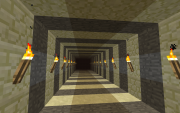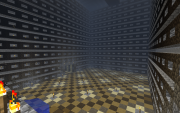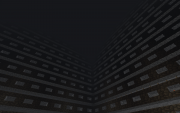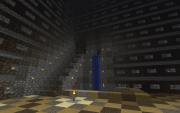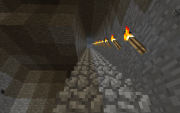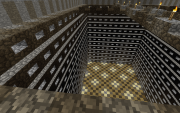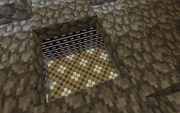The great hall of the dead
The dwarves have buried and honored their dead in the great hall of the dead for as long as the collective memory of the dwarves goes back. Some say the hall dates back to the very time Tdel Earthsmasher swung his great battle axe to carve the earth and sprinkled his red beard over the fresh ground to created the dwarves. The young, short-beards as they are referred to among the elders, scoff at this and claim it to be a myth.
The dwarves honor all their dead, and it is said that even the greatest coward swings his battle axe sure and true when he joins the ranks of Tdel Earthsmashers great army. The dead are never mentioned, but the dwarves often spend long periods of time in the great hall of the dead. A fearless dwarf is said to receive strength from his ancestors in times of dire needs, by spending two moons in the great hall of the dead with no sustenance. Short-beards must spend a fortnight alone in the great hall of the dead, consuming only what the spirits of the dwarven ancestors might offer them, as part of the mashlarch dern, the ceremony of aging, which all short-beards must pass, before they might grow their beards long.
The stairwell of mourning, leads to the bridges of no-beards. The elders refer to the leading stairs as arliech shlargh, but they are more commonly known to the dwarves as the bain of the coward. The bridges of no-beards are considered tainted by all of the lost souls previously wandered. The bridges are used for a single purpose. Any king who looses in battle, must first walk the arliech shlargh, climb the stairwell of mourning, cross the bridges of no-beards, and fling himself to the marble floor below. This ancient custom is still in practice, but no king has failed his people for a thousand years.
The last king to perform the great leap was Lebchen Bolttracker, later known as King no-beard. Bolttracker lead his people to a great victory in the great wars, but his spoil of war, the elven princess Nellas Eärfalas, would lead to his downfall. King no-beard fell in love with his prisoner of war, and made her his princess. He spent less and less time leading his people, and more and more time building pretty blue columns in her honor. Towards his end, the dwarven people were starting to rebel, and the king had lost all of his glory from the great days of the great war. The princess despised the dwarven king, and longed for her own people and the great green forests. She finally flung herself in a pool of lava ending her life. This sent Bolttracker over the edge, and he swore a great revenge on the elves, who he claimed had “tainted his princess”. Bolttracker raged war on the elves, but had lost all support among his people. Only the black guard of Guldur gave him their support. As the rest of his people the captain of the black guard of Guldur had lost all faith in his king. The dwarves and elves have raged war on each other since the very beginning of time, thus the specially trained soldiers of the black guard are from birth trained to hate all elves, and seek no other glory in life than to kill any elf. Any chance to make war on the elves gets support from the black guard, and they will follow any king to the battlefield, even a king they are certain will lead them to their death. In death they glory.
In this battle, later named the black war, seven eighths of the black guard were slaughtered, and the rest captured by the elves. Only the captain escaped, following his duty to survive any war and to be the one to train the next generation of black guard. The rest of the guard saw their death in the cells of the elves, and are doomed to wander without honor til their remains are returned to the great hall of the dead. Bolttracker regained his honor in death, but though he fights in the mighty rank of the Earthsmasher, he will be tormented by the lost soles of the war, until their honor is restored, and they too join the mighty ranks of the Earthsmasher.
The loss of the war pushed Bolttracker over the edge. Not a trace of his former honor was left, and he was forced to walk the stairwell of mourning at axe point. This was the first time since the dawn of the dwarves the bridges of no-bears were entered by any who was to return. The guards who followed Bolttracker to his final leap would never speak of what they saw or heard. A returned from the bridges is considered the worst possible omen among dwarves, who would not rage war for 300 years. The dwarven people would not be returned to their former glory for 600 years, until the war of the blight under Sagke Trollcutter.
